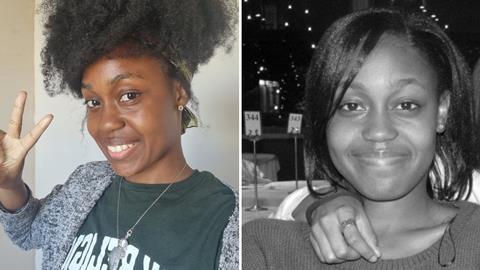Writer Maxine Harrison shares her journey of embracing her natural hair in a world shaped by European beauty standards. Through faith and self-acceptance, she discovers the beauty and worth in how God uniquely created her.

In the Black community, embracing your natural hair is often a complex journey. Living in a Western world that platforms European beauty standards, embracing natural hair and all its kinks and coils often becomes a journey of self-discovery — one that reveals how God has uniquely made us. From “nappy” ’a derogative term used to describe afro hair textures as untamed and hard to manage to “unkempt,” these are some of the negative adjectives used to describe Afro hair textures in comparison to European beauty standards. And I was guilty of falling into this trap, too.
Around the age of 12, I had my first kids’ texturiser and later transitioned to a more intense chemical hair straightener, known as a relaxer.
Around the age of 12, I had my first kids’ texturiser and later transitioned to a more intense chemical hair straightener, known as a relaxer. As someone who has quite thick, coily hair, I thought this would make it easier to style. This led me, for almost the next decade, until my final year of university, to relax my hair every 6–8 weeks.
READ MORE: Black History Month: I understand the criticism of championing ‘The Black Church’ but I also think it’s important
By 2017, as a uni student, I decided to ditch the relaxer and embrace my natural tresses. This journey helped me discover how many harmful tropes I had adopted toward the unique head of hair that God had given me. That period became the launchpad for seeing my natural hair the way God sees it — as inherently beautiful.
During university, I started watching YouTube videos of Black women sharing how to care for their natural tresses.
During university, I started watching YouTube videos of Black women sharing how to care for their natural tresses. Step by step, I learned from women who looked like me what types of products suited my hair, how to moisturise and retain moisture, and how to implement what I learned in practice. Caring for my natural tresses became therapeutic — something I had never experienced before with my natural hair. Prior to this, caring for it often triggered emotions of pain and even contempt for the hair that naturally grew from my scalp.
These YouTubers were one of the vehicles God used to teach me that caring for my hair doesn’t have to be a negative experience. I started to see God’s creative hand in my hair type. Afro hair is so unique in that it can be styled in countless ways, from braids to twist-outs to afros, offering endless possibilities for creativity and expression.
READ MORE: Why should we care about the Black Church?
My natural hair journey also taught me to take advantage of the natural resources God has given us to care for our bodies. In 2021, a few years after completely ditching relaxers, I launched my own natural hair gel after struggling to find products that prioritised natural ingredients. Luke 12:7 reads: “Indeed, the very hairs of your head are all numbered. Don’t be afraid; you are worth more than many sparrows.” This verse was a key inspiration behind creating the product. I wanted the people using my hair gels, especially those who had internalised negative views toward their natural hair, to understand the inherent worth they carry in how God has made their tresses. The feedback I received from consumers through this journey was deeply encouraging.
READ MORE: Every Christian should be concerned about the inequality in healthcare for Black people
Now, in 2025, I am experimenting more with other protective hairstyles that prioritise the health of my hair. I’m discovering new styles that suit me, which also help me recognise other aspects of the beauty God has placed within and around me. Scriptures like Luke 12:7 and 1 Corinthians 6:19–20, which speak about your body being a temple of the Holy Spirit, have encouraged me to continue embracing my hair and viewing it as inherently beautiful because it is God-given.
Looking back over this almost decade-long journey of being natural, I can clearly see God’s hand on it. The more I embrace my hair, the more I learn about who he has designed me to be. By his grace, through my work as a writer and other God-inspired creations, I’ve been blessed to help others care for their natural hair, too. Looking back, I don’t miss the burnt scalp scabs I used to get from relaxers, and I take the compliments others share about my natural hair as confirmation from God that it is more than enough in its natural state.






























No comments yet